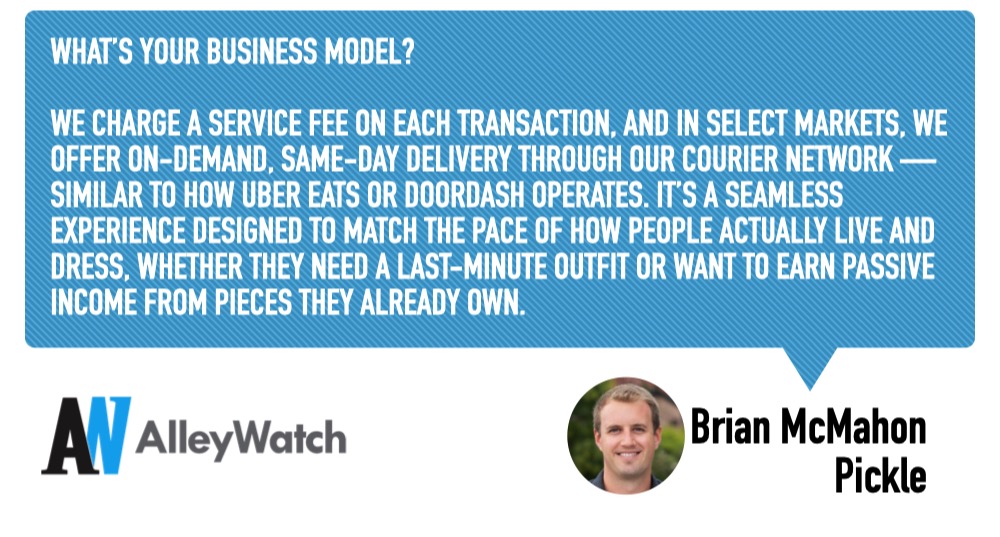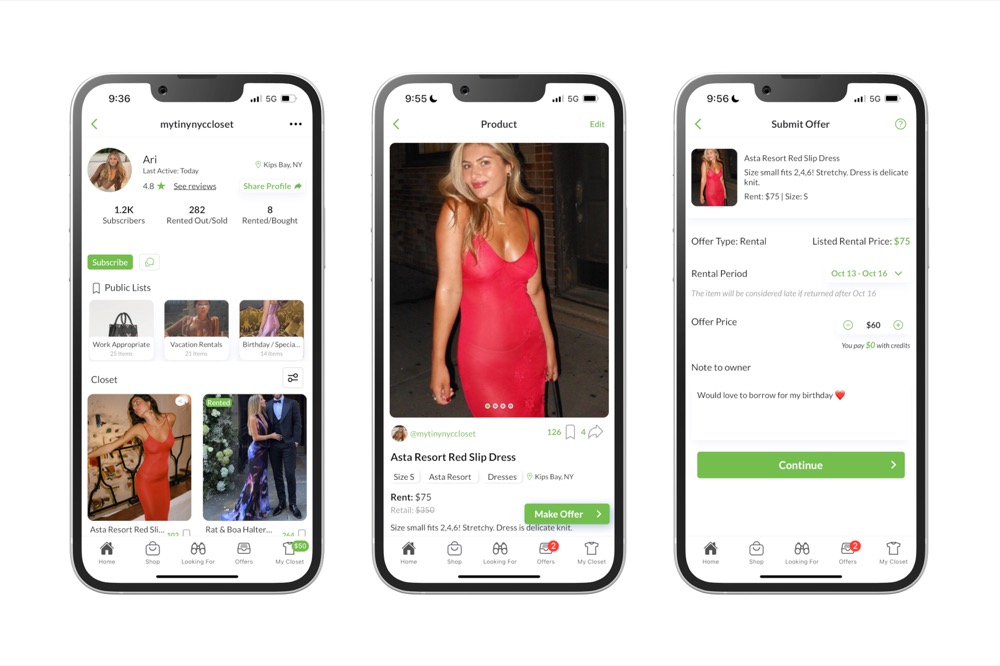In as we speak’s fast-fashion world, shoppers wrestle to maintain up with quickly altering developments whereas managing each funds constraints and environmental affect. True to the Pareto precept, the common particular person wears solely 20% of their wardrobe 80% of the time, leaving billions of {dollars} in vogue property sitting idle in closets throughout America. Pickle connects customers immediately with one another’s closets by way of its peer-to-peer vogue rental market. Customers can lease coveted items from their neighbors—whether or not it’s a designer gown for a marriage or a luxurious purse for a special day—making high-end vogue accessible whereas concurrently permitting closet house owners to earn cash from their wardrobes throughout downtime. With a community-driven mannequin that has grown to over 200,000 objects from greater than 2,000 manufacturers, Pickle creates a round financial system that modifications how folks entry, share, and monetize vogue in real-time.
AlleyWatch sat down with Pickle CEO and Cofounder Brian McMahon to be taught extra in regards to the enterprise, its mission to attach closets very like Airbnb connects houses, its future plans, and the founding story that features taking on 4,000 subway rides to hand-deliver objects in the course of the firm’s earliest stage.
Who have been your buyers and the way a lot did you increase?
Collection A $12M, which might convey complete capital to $20M. FirstMark and Craft Ventures are co-leading a $12M Collection A funding spherical with participation from Burst Capital and FJ Labs, buyers recognized for backing main marketplaces and client manufacturers like Airbnb, Uber, Pinterest, Alibaba, and Yelp.
FirstMark – Led by Rick Heitzmann, early investor in Airbnb, Pinterest, and different main client tech manufacturers.
Craft Ventures – Led by Jeff Fluhr, founding father of StubHub.
Burst Capital – Led by former Yelp executives (COO and CFO).
FJ Labs – Led by Fabrice Grinda, buyers behind Alibaba, Uber, and Airbnb.
Inform us in regards to the services or products that Pickle presents.
Pickle’s answer begins with the closet. By connecting lots of of hundreds of closets inside a group and making objects accessible for lease same-day with door-to-door supply, Pickle makes it simple and pleasant for anybody to maintain objects in circulation. To checklist: earn passive earnings between wears by merely importing {a photograph} and outline of the merchandise, setting the value and availability, and deciding on your most well-liked delivery technique (built-in courier service, self-delivery, or customary delivery for non-local leases). To lease: sustainably hold tempo with microtrends, experiment with private fashion, and entry luxurious objects for much less by purchasing Pickle’s huge number of attire on-line, in-app, or in-store. Search based mostly on location, event, fashion, curated closets, and extra. Choose whenever you need the merchandise and pay just for the time you employ it. On the finish of the rental, schedule a courier pick-up, meet up with the proprietor to return in particular person, or drop off with the lister for native leases, or mail again utilizing our pre-paid label and field
What impressed the beginning of Pickle?
In 2021, Julia (Julia O’Mara -Cofounder) and I left our analyst roles at Blackstone, each pushed by a curiosity about how folks make buying selections — and how you can assist them make higher ones. We launched the primary model of Pickle (what we now name Pickle 1.0) as a strategy to crowdsource opinions on one another’s potential purchases.
A sample rapidly emerged: folks saved recommending objects they already owned. We’d hear issues like, “That is my favourite gown — I simply wore it to a marriage,” or “This model is my go-to; it seems good on everybody.” That was the lightbulb second. We would have liked to attach a group of shareable closets — and do it in a approach that was as dynamic and straightforward as borrowing from a pal.
So we taught ourselves to code, constructed the expertise we knew folks wished, and spent months hand-delivering objects throughout NYC — 4,000+ subway rides later, Pickle relaunched because the peer-to-peer vogue rental market it’s as we speak.
How is Pickle completely different?
Not like conventional vogue rental corporations that purchase, personal, and handle stock, Pickle is a peer-to-peer market. We don’t handle warehouses or try to predict developments a 12 months prematurely whereas pre-ordering stock. Our provide is dynamic as a result of it comes straight from actual folks’s closets — which implies we will sustain with vogue in actual time.
When a brand new model or merchandise goes viral on-line, it’s typically already in somebody’s closet and immediately rentable on Pickle. That sort of velocity and suppleness lets us meet demand with out the overhead, dry cleansing, or stock administration.
We additionally don’t lock folks into subscriptions. We’ve discovered that clients worth the liberty and ease of renting on their very own phrases — no month-to-month charges, no dedication. It’s all designed to really feel as pure and seamless as sharing garments with pals.
One other key distinction: Pickle is a real two-sided market. Lots of our customers lease and lend. They earn cash by sharing their wardrobes, then put it proper again into the ecosystem. It retains vogue in circulation and fuels a community-led, ever-evolving expertise.
On the finish of the day, we’re constructing a market that’s higher, sooner, extra accessible — and extra reasonably priced — than the rest on the market.
What market does Pickle goal and the way huge is it?
Pickle is obtainable nationwide for anybody trying to lease high-quality vogue in a approach that’s extra reasonably priced, handy, and round — and for anybody trying to earn passive earnings by lending out the items sitting of their closet.
Proper now, we’re centered on girls’s clothes and accessories, with a core demographic of Gen Z and millennial girls. However that is only the start. We have now plans to develop into new classes, together with areas outdoors of vogue.
Right this moment, Pickle has tens of hundreds of renters and lenders throughout the U.S., and the chance forward is very large. Most individuals put on simply 20% of what’s of their closet 80% of the time. Which means billions of {dollars} in underutilized objects — and Pickle helps unlock that worth by turning idle objects into incomes, shareable property.
What’s your small business mannequin?
Pickle is a peer-to-peer rental platform the place customers can lease and lend objects from one another’s wardrobes, paying just for the time they want — assume Airbnb, however for closets.
We cost a service payment on every transaction, and in choose markets, we provide on-demand, same-day supply by way of our courier community — much like how Uber Eats or DoorDash operates. It’s a seamless expertise designed to match the tempo of how folks really dwell and gown, whether or not they want a last-minute outfit or wish to earn passive earnings from items they already personal.

How are you making ready for a possible financial slowdown?
Pickle is constructed for worth — which makes it naturally resilient in any financial local weather. Renters get entry to high-quality vogue for a fraction of the retail value, typically 80–90% off. Lenders earn passive earnings from objects they already personal.
Whether or not folks need to save or earn, Pickle presents a sensible, reasonably priced answer. In a slowdown, that mixture turns into much more compelling.
What was the funding course of like?
We’re actually enthusiastic about this spherical. Since mid-2023 (once we raised preliminary capital), we’ve had sturdy partnerships with FirstMark, Craft, and Burst Capital. As we began making ready to boost, we requested ourselves: who do we actually need within the room? And the reply was clear — we already had an incredible factor going. As an alternative of going out extensively, we doubled down on the relationships we’d already constructed.
Our purpose for this spherical was to herald much more market experience. Marketplaces are a singular enterprise mannequin, particularly on the buyer facet, and there aren’t many buyers with deep expertise on this area. That’s why we additionally introduced FJ Labs on board — they’ve backed among the most profitable marketplaces on the market, and their experience in consumer-facing platforms is invaluable.

What are the largest challenges that you just confronted whereas elevating capital?
One of many early challenges got here after we pivoted and launched Pickle as a peer-to-peer rental market in Might 2022. We’d initially launched Pickle in 2021 as a platform to crowdsource opinions on purchases, however the constant theme we noticed — folks recommending objects already of their closet — led us to rethink the mannequin and construct what Pickle is as we speak.
We didn’t increase vital outdoors capital till over a 12 months later, in June 2023. That first stretch post-pivot was all about proving that this new model of Pickle — {the marketplace} — was one thing folks would really use and return to typically. We would have liked time to point out traction: repeat renters, rising provide, sturdy retention, and natural word-of-mouth.
By the point we raised once more, the story had modified considerably. Phrase of mouth had picked up, and we have been getting extra inbound curiosity from buyers. There’s clearly rising pleasure round round vogue, however we nonetheless needed to differentiate ourselves from extra conventional resale or subscription-based rental fashions. We’re asset-light, fast-moving, and don’t carry the overhead of storage or cleansing — and that took some explaining in an area the place many buyers default to evaluating us to older, inventory-heavy, asset-heavy fashions.
One other main focus throughout this spherical was engagement. Pickle is a market, however a lot of our consumer conduct mirrors a social platform. Practically 50% of our month-to-month energetic customers are additionally weekly energetic customers. That degree of stickiness, mixed with a community-driven mannequin, actually stood out. Individuals use Pickle not simply to lease, however to browse, uncover new manufacturers, and discover private fashion by way of different closets — and that blend of utility and inspiration was one thing our buyers bought enthusiastic about.
What components about your small business led your buyers to jot down the test?
Our buyers have been drawn to a mix of fast development, sturdy engagement, and natural community results which are uncommon to see this early. Over the previous 12 months, we’ve greater than quadrupled internet income and tripled our month-to-month energetic customers. Half of these month-to-month energetic customers are additionally weekly energetic, and far of that development has been natural — pushed by word-of-mouth and deep model affinity.Right here’s what a few of our buyers needed to say:
“At FirstMark, we hardly ever double down this early, however Pickle is proving to be a kind of uncommon marketplaces the place virality, natural development, and deep client love are creating extraordinary community results—it reminds us of the early days of Instagram, when a community-first strategy and easy but sticky product drove explosive engagement. The retention, engagement, and community-driven enlargement we’ve seen are alerts of a really category-defining enterprise. Pickle isn’t simply constructing a vogue rental market—it’s pioneering a brand new approach for shoppers to entry and monetize high-quality items at scale. We couldn’t be extra excited to proceed supporting Brian, Julia, and the Pickle group as they redefine the way forward for commerce.” — Rick Heitzmann, Cofounder and Associate, FirstMark
“Pickle is redefining how younger shoppers have interaction with vogue—not simply as shoppers, however as trendsetters and entrepreneurs. The engagement metrics are off the charts because of an engaged group of customers who scroll the app a number of occasions a day to take a look at the most popular developments. As new developments emerge, Pickle’s group immediately responds by itemizing, renting, and shaping what’s subsequent. Pickle has what everyone desires: the engagement metrics of a social app with the monetization energy and scalability of a market. Brian and Julia deeply perceive what makes marketplaces thrive, and we’re thrilled to proceed supporting them as they scale Pickle right into a category-defining enterprise.” — Jeff Fluhr, Common Associate, Craft Ventures
What are the milestones you intend to attain within the subsequent six months?
We’re centered on three key areas: group, product, and market enlargement.
We’re constructing out the group throughout engineering, logistics, advertising, and development to assist our subsequent stage. On the product facet, we’re rolling out a modern new net platform together with options that make closet administration and product discovery simpler — plus upgrades that make your entire Pickle expertise extra enjoyable and rewarding.
We’re additionally increasing markets. Whereas Pickle is obtainable nationwide, a big portion of our stock is in NYC and LA.. Over the following six months, we’re ramping up efforts to convey extra provide to further cities, together with Miami, Chicago, Dallas, and San Francisco.
What recommendation are you able to provide corporations in New York that would not have a recent injection of capital within the financial institution?
Focus in your core worth prop and the shopper you serve greatest. Firms that clear up actual issues — and clear up them properly — will win.
New York is an unimaginable place to construct, particularly for client startups, due to the sheer quantity and variety of individuals. Use that to your benefit.
And above all, be scrappy. Each greenback — whether or not spent or earned — counts.The place do you see the corporate going now within the close to time period?
We’re centered on rising the group and increasing into new markets, whereas persevering with to go deep in cities the place we’re already seeing sturdy, natural momentum — together with New York, LA, Miami, San Francisco, Chicago, and Dallas.
What’s your favourite spring vacation spot in and across the metropolis?
A stroll alongside the West Facet Freeway — and ideally ending up at a restaurant with outside seating.





















